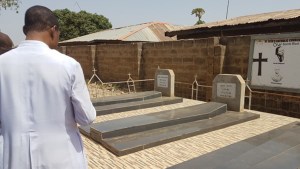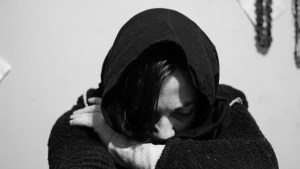Peter Okpaleke, a Nigerian prelate with an unusual background, is one of the new cardinals to be created at the end of the summer.
He had a difficult time becoming a bishop, let alone a cardinal.
When he was named by Benedict XVI in 2012, his would-be diocesan flock rejected him. He eventually resigned and was appointed bishop of a diocese created for him two years later.
I.MEDIA takes you through the journey of this bishop who was humiliated by his flock and is now rewarded by Pope Francis.
On Sunday, May 29, when the name of Bishop Peter Okpaleke was pronounced by Pope Francis from the window of the Vatican’s Apostolic Palace – at number 5 of 21 – few of the faithful gathered in St. Peter’s Square understood that the Argentine Pontiff was sending a very strong message to the Church in Nigeria. The story of Bishop Okpaleke may be original, but the general public does not necessarily know it. And perhaps that’s why the 85-year-old Pontiff chose to create him a cardinal: to shine a spotlight on the scourge of tribalism, this form of “domestic xenophobia” that he has denounced since his election to the Throne of Peter in 2013.
Peter Ebere Okpaleke was born on March 1, 1963, with his twin brother – now deceased – in a village in Anambra State, southern Nigeria. He and his four siblings were raised by his maternal grandmother. He traces the origin of his vocation to a Sunday in 1972, when he was enlisted to serve Mass to replace the other altar boys who were absent due to rain. This first service at the altar marked him.
Ten years later, he entered the seminary and was ordained a priest in 1992. He continued his studies after his ordination, notably in Rome (1999-2002) where he obtained a doctorate in canon law with honors at the University of the Holy Cross. He also holds a degree in ecclesiastical administration.
Assistant Secretary to the Bishop of the Diocese of Awka (1992-1995) and then Financial Administrator, he was finally Chancellor of the Diocese from 2002 to 2011.
On December 7, 2012, Pope Benedict XVI named him bishop of Ahiara. The diocese is only a hundred kilometers south of Awka, his home diocese, but the sociology of the region is quite different, and the 49-year-old bishop’s problems began.
Rebelling sheep
As soon as the appointment was announced, the diocesan people – priests and laity – in Ahiara rebelled. The reason, some say, is that Peter Ebere Okpaleke is not incardinated in the diocese of Ahiara. This is a clever way of not mentioning the ethnic origins of the young prelate. Unlike his predecessor, who was of Mbai ethnicity, the majority in the diocese, Bishop Okpaleke is of Ibo ethnicity – like Nigerian Cardinal Francis Arinze – the majority in southeast Nigeria.
Faced with the rebellion, Bishop Okpaleke asked that the date of his episcopal consecration be postponed by a few weeks, hoping that the situation would calm down. In vain. He was finally consecrated outside the diocese of Ahiara, at the seminary of the “Seat of Wisdom” in Ulakwo, in the archdiocese of Owerri.
Pope Francis thinks of abolishing the diocese
Months went by without the situation moving, despite the interventions of other Nigerian bishops and Rome. Benedict retired in the midst of this, and it was finally Pope Francis who took matters into his own hands. On June 8, 2017, now more than four years after his appointment, in front of a delegation from the rebellious diocese, Francis compared the recalcitrant faithful to the “murderous vintners” of the Gospel. “Those who opposed the takeover of the bishop, Bishop Okpaleke, want to destroy the Church.”
Asserting that he has been following the situation for years, he thanked the bishop for his “holy patience” and then presented his intentions: “I listened and thought a lot, especially about the idea of suppressing the diocese; but then I thought that the Church is a mother and she cannot abandon so many sons like you. I feel great sorrow for those priests who are being manipulated, no doubt also from abroad and outside the diocese.”
He then demanded that each priest or clergyman of the Diocese of Ahiara write a letter stating his intention, in which he asks for forgiveness; all of them were to write individually and personally. The head of the Catholic Church gave them 30 days to renew their obedience to the Pope and accept their bishop. “Whoever does not do so ipso facto will be suspended a divinis and will lose his office,” he warned, arguing that the scandal had gone on too long.
The threat was significant, and yet, the situation endured. According to the Fides agency, 200 priests wrote individually to the Pope, promising obedience and fidelity. But some of them emphasized in their letters their difficulty in collaborating with Bishop Okpaleke after years of conflict. A few days after the Pope’s request, a demonstration of nearly 3,000 people was organized in front of the Ahiara cathedral to reject the bishop once again.
A situation that “threatens the salvation of souls”
Faced with the paralysis, “the bishop without a diocese” ended up submitting his letter of resignation to the Argentine Pontiff in early 2018. “Unfortunately, the situation in the Diocese of Ahiara, to my knowledge, has not improved. More importantly, it has threatened my spiritual life,” he wrote.
Convinced that remaining bishop of Ahiara “is no longer beneficial to the Church,” the prelate said he felt it was time to step down. “To minister in a diocese where the priests who are supposed to be my immediate and closest collaborators, my brothers, my friends and my sons, are at war with each other, with the laity and with me, their chief shepherd, would be disastrous and threaten the salvation of souls – including my own soul.”
Okpaleke sees his resignation “as the only appropriate option to facilitate the re-evangelization of the faithful of the diocese, especially the priests.”
He told the Pope that he and the Curia can now count “the priests who have truly affirmed their loyalty to the Holy Father and those who have decided to withdraw from the Catholic Church out of disobedience.” And Pope Francis accepted his resignation on February 19, 2018.
Two years passed before Archbishop Okpaleke’s name returned to the forefront. On March 5, 2020, he was named Bishop of Ekwulobia, a diocese specially carved out for the 57-year-old bishop. The Nigerian was installed in his cathedral the following April 29. He then took over the reins of a diocese of one million inhabitants (61% Catholics) with 250 priests.
When the Pope unveiled the list of new cardinals in Rome on May 29, the Nigerian bishop had just come out of a Mass during which he had given the sacrament of confirmation to 138 faithful. When he heard the news, he thought it was a joke played by his secretary.
To Vatican News, the cardinal-designate tells us that his difficult years have allowed him to touch the peace of God, a peace that he draws from his special relationship with the Virgin Mary and Jesus in the Eucharist, and also from the Holy Spirit, to whom the bishop dedicated his episcopal motto: “Veni sancte Spiritus.”
A Pope against tribalism
While Pope Francis was certainly touched by the personal ordeal endured by the Nigerian bishop, he no doubt also wanted, through this appointment, to once again rebuke tribalism, a scourge that afflicts Africa. When asked about this issue on the flight home from his 2019 trip to Mozambique, Madagascar, and Mauritius, Pope Francis was very clear about this “cultural problem” that the continent must resolve.
“We commemorated the 25th anniversary of the tragedy of Rwanda a short time ago: It is an effect of tribalism,” he insisted, recalling moreover his trip to Kenya four years earlier. “I remember in Kenya, at the stadium, I asked everyone to stand up and join hands and say ‘no to tribalism, no to tribalism.'”
From now on, Cardinal-designate Okpaleke will be a symbol of this fight against tribalism, which is part of Pope Francis’ tireless calls for fraternity and remains a complex challenge within the Church itself.



